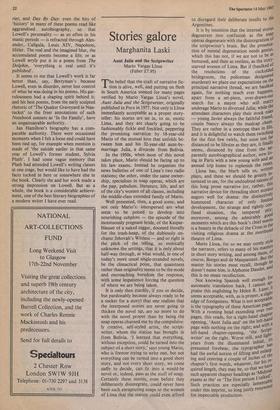Stories galore
Marghanita Laski
Aunt Julia and the Scriptwriter Mario Vargas Llosa (Faber £7.95)
The belief that the craft of narrative fic- tion is alive, well, and putting on flesh in South America seemed for many pages verified by Mario Vargas Llosa's novel, Aunt Julia and the Scriptwriter, originally published in Peru in 1977. Not only is Llosa immediately acceptable as a proper story- teller: his stories are set in, to us, exotic Lima, and they are clearly going to be fashionably fickle and freckled, peppering the promising narration by 18-year-old Mario of the mutual love that unfolds be- tween him and his 32-year-old aunt-by- marriage Julia, a divorcee from Bolivia.
In the 1950s, when most of this novel takes place, Mario should be facing up to his law exams. Instead he organises the news bulletins of one of Lima's two radio stations; the other, under the same owner- ship, specialises in soap operas, which are the pap, pabulum, literature, life, and art of the city's women of all classes, including the middle-class extended family of Mario.
Well presented, then, a good scene, and not only Mario's: interspersed are what seem to be poised to develop into nourishing subplots — the episode of the incestuously pregnant bride, of the Kaspar- Hauser of a naked nigger, doomed literally for the trash-heap, of the dubiously un- chaste Jehovah's Witness — and so right is the pitch of the telling, so exotically unknown the settings, that it is only about half-way through, at what would, in one of today's more usual single-stranded novels, be the climactical point, that quaintness rather than originality seems to be the mode and encroaching boredom the response, with some impatience forcing the question of where we are being taken.
It is only then (tardily, if you so decide, but pardonably because always ready to be a sucker for a story) that one realises that the interposed stories are never going to thicken the novel up, are no more to do with the novel proper than by being the soap operas churned out by the compulsive- ly creative, self-styled artist, the script- writer, whom the station has brought in from Bolivia. 'I learned that everything, without exception, could be turned into the subject of a short story,' says young Mario, who is forever trying to write one, but not everything can be turned into a good short story, and not every short story, we come sadly to decide, can fit into a would-be novel or, indeed, pass as the stuff of soap. Certainly these stories, even before they deliberately disintegrate, could' never have been such enrapturing soaps to the women of Lima that the station could even afford The Spectator 14 May 1983 to disregard their deliberate insults to the Argentines.
It is by intention that the internal stories degenerate into confusion as the soap operas degenerate with the disintegration of the scriptwriter's brain. But the
presenta- tion of mental degeneration needs genius, which this has not, if we are not to be as bemused, and then as restless, as.the story starved women of Lima. But if (baulked of the resolutions of the cuckolded bridegroom, the policeman designated murderer) we place our expectations on the principal narrative thread, we are baulked again, for nothing much ever hanPens' apart from a set-piece, over-drawn-out search for a mayor who will Mari,' underage Mario to divorced Julia; while the attendant characters play their stock roles — young Javier always the faithful friend, cousin Nancy always the madcap churn. They are rather in a zoetrope than in life' and it is delightful to watch them twitching for the first few twirls, but soon too far distanced to be lifesize as they are, it finallY seems, distanced by time from the ay- parently autobiographical author, now liv- ing in Paris with a new young wife and an annual trip home to replenish the roots. Llosa has, the blurb tells us, writt;e11 plays, and these we should be greatly ill: terested to see, for the undoubted talents of this long prose narrative (or, rather, this narrative device for threading short stones) augurs well for drama: the distinct1y. elY. humoured character of only lirnitecl development, the strange and tightly CO' fined situation, the tempered PitY,' moreover, among the admirably gnou moments which are this book's chief merits is a beauty in the debacle of the Cross in the, visiting religious drama at the moribuno theatre of Lima. Mario Llosa, for so we may surely Ole the narrator, refers to many of his master in short story writing, and among than' course, Borges and de Maupassant. But til` master his stories most recall, though lice, doesn't name him, is Alphonse Daudet, an this is no mean recollection. Not knowing Spanish well enough ,0 automatic automatic translation back, I cannot aP.; praise this englishing by Helen R. Lane.: I. seems acceptable, with, as is proper, a. sligh, edge of foreignness. What is not acceptable is the typography of these American pages' With a running head extending over two pages, this reads, for a right-hand chat°, opening, 'Aunt Julia and' on the left-ban: page with nothing on the right; and will' left-hand chapter-opening, 'the Se.riPt_ writer' on the right. Worse still, and high.% years from the illuminated initial. It, presumed forebear, the typographer, ha: had the awful notion of lifting and enlarge ing and centring a couple of inches 0! 01, chapter's first words, whatever, for his re quired length, they may be, so that we have_ such apparent chapter headings as ,MidYef exams at the' or 'The first person I talkea,; Such practices are especially lamentablA under this impeccable production. dtio
soicltonng.justly renown for e"










































 Previous page
Previous page